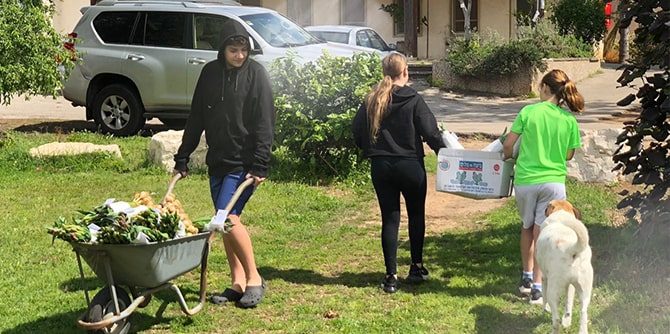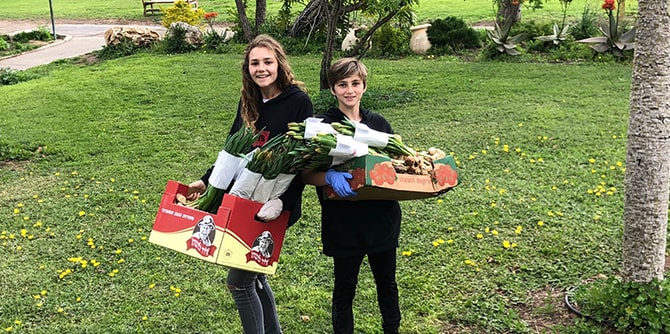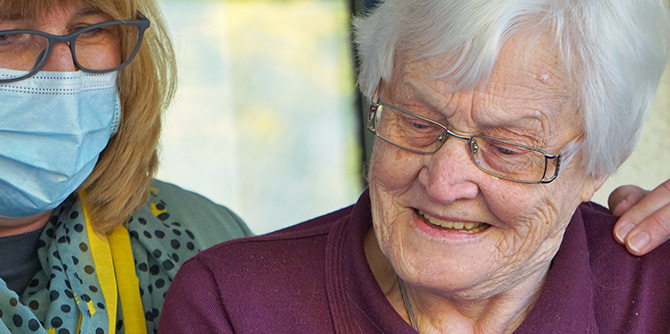With the outbreak of the coronavirus crisis, municipal and community systems suddenly found themselves in a state of emergency and were forced to shut down and discontinue many of their social and community services, severely impacting a community's ability to cope with the situation. This raised the need for action that would enable the public to deal with the unfolding crisis — action that would emphasize community resilience as a central element in dealing with what has become an ongoing state of emergency.
Two graduates of the Mandel School for Educational Leadership who are experts in the field of community building teamed up to address this need:
Guy Tsfoni, director of Community Strategies, an organization for establishing community resilience and social capital, and
Dr. Sara Shadmi-Wortman, an international expert in the field of community building as a process for creating resilient communities. These two Mandel graduates are both involved in MAHUT Israel, a nonprofit organization specializing in emergency preparedness and resilience building.
The national initiative established by Tsfoni and Shadmi-Wortman aims to both increase and leverage a community's own strength and capacity with the goal of enabling the continuity of important community functions during the routine stage of the crisis. Designed to be implemented in a total of 80 communities, the program seeks to bolster strength, social solidarity, and the ability to cope in three types of communities: education communities for children and youth, communities of young people (college students and community activists), and communities of senior citizens.

To reach its goals, the initiative assembled a team of experts in the fields of emergency, resilience, and community, who are creating a model of community resilience appropriate for a period of extended emergency. The initiative has also developed inter-organizational partnerships that will facilitate implementation of this model in 80 communities across Israel, and is providing training and guidance to the professionals who are employing the model in the communities themselves. The entire process is being documented, monitored, and evaluated by Community Strategies and MAHUT Israel, the initiative's two founding organizations.
As part of this collaborative initiative, Tsfoni and Shadmi-Wortman are working with three organizations active in the field, each of which services one of the three target populations:
Shvilim, the education network of Israel's rural sector, which is run by the Kibbutz movement;
Tozeret Ha’aretz, established by the National Student Union, which operates some 60 student communities in Israel’s socio-geographic periphery; and
Kehila Le’Dorot, established by the Joint Distribution Committee (JDC), the Ministry of Welfare, and the Dalia and Eli Hurvitz Foundation, which provides an integrative solution for the needs of senior citizens.

For
education communities in rural areas, the initial stage of the crisis was particularly difficult, because unlike other systems that transitioned to emergency mode, informal education was largely shut down and most of the professional staff put on leave. Local emergency teams became responsible for children and youth, with community directors, culture coordinators, and volunteers providing alternatives to school. As the crisis unfolded, educators in these rural areas asked themselves why the informal education system was not perceived as an asset and resource for coping with the crisis and why the community resilience it has built for routine times was not suitable in times of emergency.
To deal with these questions and the crisis itself, the heads of the initiative embarked on an accelerated process for developing a model of resilience for local community education that is appropriate both for an acute emergency situation and for a scenario in which we are living for an extended period of time in the shadow of the coronavirus. The model is being developed by a multidisciplinary team of experts from different fields together with twelve expert consultants from
Shvilim, who work with over 70 educational communities across Israel. The model will be piloted in 30 localities, and has the potential of being implemented in as many as 800 communities throughout Israel (regional councils, kibbutzim, and moshavim).
Within the
communities of young people, when academic studies shut down due to the lockdown, many students became active in the municipal emergency services where they lived. They distributed food and medicine, staffed hotlines, drove people to appointments, and more. In becoming involved in providing emergency services, they were no longer able to fulfill their usual role. In cities in which student communities are active, they increase involvement and the sense of belonging of the local residents. This contributes to community resilience in times of emergency. When the young people abandoned their traditional role and joined efforts to provide for urgent needs, there was no one else to fulfill the role of increasing community resilience during the emergency situation. As part of the initiative,
Tozeret Ha'aretz will study what happened during the COVID-19 crisis and will propose new ways of strengthening community resilience both in routine and in times of emergency.

With regard to
communities of seniors, the initiative is leading a nationwide analysis of the successes and failures of these communities during the coronavirus crisis, in order to produce a professional toolkit for strengthening this population during both periods of acute crisis and a state of ongoing routine emergency. The initiative will publicly appeal to welfare departments, community centers, and senior leadership groups throughout the country to obtain examples of successful community resilience mechanisms that were used for this population during the crisis. The examples that emerge will serve as the basis for a future model for this community. It will initially be piloted in 30 senior communities that will receive intensive training and guidance in implementing the model as preparation for the possibility of future waves of COVID-19. After conclusions from the pilot are drawn, the model will then be implemented in 90 localities throughout Israel.
This collaborative initiative led by Community Strategies and MAHUT Israel is designed to enable rapid deployment and impact on a national level. By enlisting organizations that work with different populations across the country, the initiative will have an effect on thought leaders, policy makers, heads of educational systems, community workers, change agents, activists, and community leaders throughout Israel. This will allow the program to impact vast swaths of society, infusing the public not only with the discipline to adhere to health regulations, which was the thrust of the first acute stage of the coronavirus crisis, but also with a sense of meaning, belonging, partnership, and involvement. As a result, responsible behavior will become part of the DNA of the community, and will emerge from the bottom up rather than solely from the top down. This will increase the fortitude and solidarity of the community, both in times of acute emergency and during the ongoing state of alert required by the worldwide pandemic.
Photos courtesy of Shvilim, the Kibbutz Movement.
